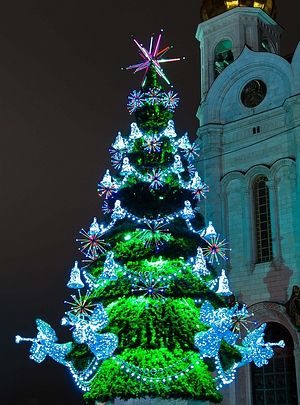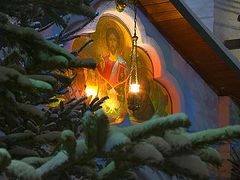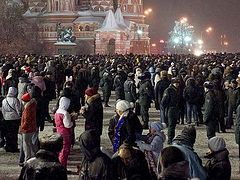The feast of the Nativity demands from us a long fast and serious spiritual preparation, so that we would be able to greet it in love and joy. Why we should fast in preparation before the Church feasts is a complicated question.
Archdeacon Andrei Kuryaev says that this tradition developed out of great Christian love towards the pagans and Jews who desired to receive Christ and fasted beforehand. For, according to tradition, they used to be baptized on great feasts, and the fasts naturally were a preparation. Ancient Christians began fasting, according to this theory, out of solidarity with those who wished to receive Christ and be joined to the Church.
But the fact remains: We fast and should find benefit for our souls in this.
And now, right before the culmination of our joy, a week before the Nativity event, the world suggests that we celebrate the New Year, with the whole New Year industry, the television tidal wave and holiday psychology in society.
What should we do? We can try to find a compromise; especially since everything presupposes this: the Christmas trees in our children’s schools, the general Christmas vacations, and finally, the accumulated fatigue for Orthodox Christians from the fast—from our voluntary but no less burdening fast. We so long to relax the severity and uncompromising nature of Orthodoxy, smooth out its parallel existence with the world, and even slightly cross these uncrossing straight paths, at least to please common sense and social good for our children and ourselves. For this we have to proclaim the New Year as having nothing against Orthodox faith. We present this to our opponents and move on to the next point: We have to find a basis for its usefulness. Truly, we have worked all year long non-stop, some even without vacations, and now, finally, we have the chance for a deserved rest—to sit down with our families, drink champagne, eat something tasty, watch the TV, Times Square, football, and the fireworks that ring in the New Year!
We have been accustomed from childhood to all the trappings of the New Year table. We always watch the same film re-runs, and give each other gifts. This is a joyful holiday for everyone.
A child has a worldview that is less flexible and more categorical than an adult’s. Adults can celebrate the New Year and then take themselves in hand and explain to themselves that Christmas is something else, a greater holiday; it is a spiritual festival and the birth of God on Earth—maybe less fun than New Year’s day and in fact more demanding of ascetical labors. But in a child’s consciousness, New Year’s Day surpasses Christmas because there is no labor of standing through Church services, and there are fireworks. The value of Christmas, which is definite for the parents, turns into an inner conflict for the children in reality. The season parties have already been celebrated at school, and the Christmas shows are over. We can explain to them for a long time that there was no holiday, that it’s a fast time for us, and the real holiday is yet to come… The children won’t believe it. We’ve already dropped a conflict into them with Christmas, which they might look at all their childhood and teenage years as a family injustice, and be the cause of a disharmonious development of faith in them.
Could it really be that Christianity requires a departure from the world even unto contempt for national holidays? Not at all; in fact, as the Lord had no contempt for the Old Testament Law, and as He Himself said, fulfilled it all, we too can in all fairness greet the New Year in accordance with our spiritual needs. Of course, we all go to church on New Year’s Eve in order to thank the Lord together for the past year during the “New Year moleben”. But some people I know take it even further. Many Orthodox Christians, who honor the memory of St. Boniface, which is celebrated by the Church on January 1, prepare on this day to receive Communion, cleansing their souls with repentance and spending the evening before accordingly, in reading of prayers set forth for Orthodox Christians to prepare themselves to receive the Holy Sacrament of Christ. Prayers at the Liturgy and Communion, in this way, signify the beginning of the New Year.
In the everyday life of little children it is often necessary to artificially emphasize the importance of the feast of the Nativity—so that the worldly festivities of New Year would not cross out the importance of the Savior’s birth into the world. In our family, we set up the Christmas tree before New Year, it exudes it fragrance for a week in its primordial state, and is dressed only before Christmas. The forest beauty’s presence in the home evokes the foretaste of gifts, Christmas feasting, carols, matinées, and of course, Christmas day itself. On Christmas Eve, mother and children dress the tree, and hang the lights, which will of course only be lit after the Christmas services. The aromas from the kitchen will surpass all imagination and multiply the pre-festal mood. These children’s impression will remain with them all their lives. And their wholesome Christian worldview will remain uninjured, and become for the child a bridge to his maturity—in Christ.
Perhaps there is a point in being at least in some things lovers of a parallel world, an “Orthodox extremism”?
If only so that morning, or even at night, when returning home from the snow-white service dedicated to the supernatural coming into the world of the Messiah, they might find under the tree their long-awaited and beautiful, crisp and magical Christmas presents.





